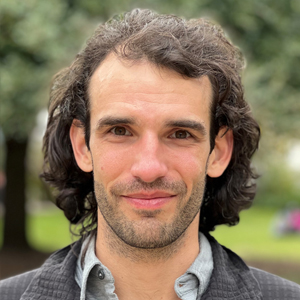
Jimmy D. Gollihar, Jr., PhD
I am a Scientist and the Head of the Antibody Discovery & Accelerated Protein Therapeutics (ADAPT) laboratory at the Houston Methodist Research Institute (HMRI). My work encompasses a broad range of engineering biology, from the design of simple genetic “parts” and circuits to protein engineering and industrial biomanufacturing. I use synthetic biology applications to domesticate non-model organisms and engineer proteins or biosynthetic pathways with therapeutic and industrial potential. I apply a holistic approach to protein engineering by integrating concepts from directed evolution, rational design, and artificial intelligence to create biological countermeasures, diagnostics, and vaccine candidates. Recently, my group has contributed to the genomic surveillance and characterization of SARS-CoV-2, B-cell repertoire mining for neutralization and protection assays, and the engineering of enzymes intended for mRNA vaccine manufacturing.
Early in the pandemic, we recognized that the absence of a SARS-CoV-2 antigen created an international bottleneck for the development of COVID-19 diagnostics and therapeutics. To address this constraint, we created several stable cell lines for mass production of spike antigen in collaboration with Dr. Jason McLellan. Through collaborations at the University of Texas at Austin and Texas A&M University, we developed a high-throughput pipeline to produce spike and receptor-binding domain (RBD) antigen for serological testing. We produced and distributed spike and RBD antigen nationwide to other academic, governmental, and commercial partners. Notably, our antigen was used to screen convalescent plasma at the HMRI to enable timely treatment of critically ill patients. The antigen was also used in numerous antibody and small-molecule discovery efforts across the nation and Europe. These efforts formed the basis of numerous production runs across industry and academic labs throughout the US.
We also invented methods to characterize spike mutations emerging in variants of concern (VOCs) using mammalian synthetic biology. The SARS-CoV-2 spike protein is a critical component of subunit vaccines and a target for neutralizing antibodies. Further, spike undergoes immunogenic selection resulting in variants that increase infectivity and partially escape neutralization by convalescent plasma. We developed Spike Display, a high-throughput, automated platform to rapidly characterize glycosylated spike ectodomains across multiple coronavirus-family proteins. We assayed variant SARS-CoV-2 spikes for gene expression, ACE2 binding, and recognition of known neutralizing antibodies (nAbs). Our method has been used to screen VOCs in near real-time and afforded the opportunity to understand mechanisms of escape and virus evolution. We anticipate that Spike Display will accelerate antigen design, structure-function studies, and antibody epitope mapping for SARS-CoV-2 and other emerging viral threats.
The ongoing adaptive evolution of SARS-CoV-2 genome sequences to create more easily transmissible and infectious variants has sparked concern over the continued effectiveness of existing vaccines and therapeutic antibodies. Increased genomic surveillance and methods to rapidly develop and assess effective interventions are critical for interrogating adaptive immunity and developing rapid-response biological countermeasures to emerging pathogens. Using our foundry, we discovered SARS-CoV-2 neutralizing antibodies isolated from COVID-19 patients using a high-throughput platform that we developed during the COVID-19 pandemic. We identified antibodies from unpaired donor B-cell and serum repertoires using yeast surface display, proteomics, and public light chain screening. Our strategies should prove broadly applicable to adaptive immunity interrogations of emerging pathogenic threats.
In addition to our pandemic response work, I have spent the last four years as a DoD scientist. In that time, I designed and built the Army’s Biological Foundry co-located at the University of Texas at Austin. This work increased DoD capability in the field of synthetic biology for early-stage research efforts. From 2019 to 2021, I also served as the government CTO of the Bioindustrial Manufacturing Innovation Institute–BioMADE. As the technical architect of the institute, I led the creation of a public-private partnership to develop innovations at scale for biological production of non-medical products. Prior to that, I led an in-house R&D effort in the private sector.

Daniel R. Boutz, PhD
Dr. Boutz has considerable expertise in proteomics, biochemistry, and molecular biology. With a background in structural biology, he has dedicated the last 16 years to mass spectrometry-based proteomics and uses a wide range of methods to study a variety of organisms, including viruses, bacteria, fungi, plants, and various animal species. Dr. Boutz has previously analyzed the expression and ubiquitination of murine cytomegalovirus proteins, the temporal expression of lytic phage proteins in bacteria, and the changes in protein expression induced by T cell activation. In recent years, his research has focused on proteomic profiling of monoclonal antibodies in serum, exemplified by the development of the IG-Seq proteomics pipeline to address the high rate of false positive peptide identification unique to immunoglobulin proteins. During the COVID-19 pandemic, Dr. Boutz’s IG-Seq analysis helped to identify neutralizing antibodies with activity against SARS-CoV-2.

Andrew Horton, PhD, Research Scientist
Dr. Horton earned both his BS and PhD in Biomedical Engineering from the University of Texas at Austin. Dr. Horton completed a postdoctoral fellowship in bioinformatics applied to immunology, also at the University of Texas at Austin, before joining the nascent SARS-COV-2 pandemic response team at the University of Texas under the leadership of Dr. Jimmy Gollihar. As the team’s computational and data scientist, Dr. Horton was involved in the creation of their antibody discovery platform, developing methods central to its success, and supported additional SARS-CoV-2 projects and collaborations through software development and data analysis.
Dr. Horton joined the Houston Methodist Research Institute as a research scientist with the ADAPT team in January 2022, where he continues to perform research directed towards the development of experimental and computational methods for therapeutic antibody discovery and vaccine development

Thomas Segall-Shapiro, PhD, Research Scientist
Dr. Segall-Shapiro received a dual BS/BSB from Rice University in Biochemistry and Cell Biology and Bioengineering. He went on to earn his PhD in Bioengineering from the Massachusetts Institute of Technology, where he focused on building new systems to control gene expression. Dr. Segall-Shapiro completed his postdoctoral training at MIT and the DEVCOM Army Research Laboratory in Adelphi, Maryland, where he subsequently worked as a biologist until joining the Houston Methodist Research Institute as a research scientist with the ADAPT team in January 2022.
In his research, Dr. Segall-Shapiro uses genetic engineering to build biological systems that carry out useful functions. He has developed tools to engineer new protein activities using libraries of split and chimeric proteins and built and characterized new genetic circuits to control these functions. Currently, Dr. Segall-Shapiro’s research focuses on combining high-throughput biology and directed evolution to generate antibody therapies and explore other genetically tractable therapeutic platforms.

Raghav Shroff, PhD, Research Scientist
After receiving bachelor’s and master’s degrees in Bioengineering from Rice University, Dr. Shroff earned his PhD in Cellular and Molecular Biology from the University of Texas at Austin, where he served as a Graduate Research Assistant in the laboratory of Dr. Andrew Ellington. At the Ellington Lab, Dr. Shroff extracted underlying biological phenomena from large data sets and made use of directed evolution to impart novel functionality to protein structures. Dr. Shroff spent one year as a research biologist at the DEVCOM Army Research Lab in Austin, Texas, where he used artificial intelligence/machine learning (AI/ML) approaches to identify or mutate proteins with improved properties, including some of the first examples of proteins engineered with AI.
Dr. Shroff joined the ADAPT team as a research scientist at the Houston Methodist Research Institute in January 2022. His current research involves the creation of AI/ML algorithms to engineer the affinity and stability of a plethora of candidate antibodies as well as the production of a diversity of antigens for serological testing, vaccine design, and challenge studies.
